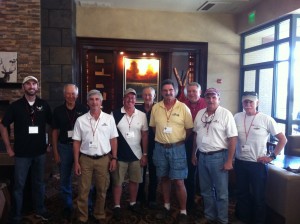LOBO board members frequently (every week) get phone calls from individuals regarding a Lancair purchase. Usually, they see our website and call, or they may be referred to us by Lancair or a third party. These folks are interested in the following information:
- Where can I get a “pre-buy” inspection?
- Where can I get insurance?
- Where can I get training?
I’ll address these in order, but before I do let me make a few comments. I try to find out a little about these people to understand if they are a good fit experience-wise for a Lancair. I ask how many hours they have, what they are currently flying, whether they have an instrument rating, etc. Not everyone is a good candidate to be flying a Lancair. On occasion I have tried to dissuade someone from purchasing a IVP or IVPT. At this year’s LOBO/Lancair Landing in Broomfield the flight instructors discussed this very topic and agreed that low time pilots should not be flying the IVP, IVPT and Evolution. A few years ago a low time pilot (less than 1000 hours total time, little to no complex time or no instrument rating) could not get insurance on these aircraft—now they can get insurance coverage due to a soft insurance market. This is happening elsewhere in GA. These folks are at a very high risk of having an accident in very soon after purchasing a Lancair. Low total time combined with low time in make/model is an identified risk factor.
What can we do? Some might argue that we should train these pilots. That has been considered, but not very many Lancair instructors can devote 50-100 hours over six-to-twelve months to train a single individual. Unlike what you hear from the non-CFI’s on LancairTalk, it could take that many hours to train a 200-hour (or fewer!) Cessna 172 pilot to competence in a IVP/IVPT/EVO flying above FL 250. None of the pilots in this low-time situation are razor sharp ex-military Chuck Yeager types or Ernie Gann-like retired airline pilots. All of them are Part 61 trained pilots from the Acme School of Flying. The issue for some of these pilots may not be the hours devoted to hand eye coordination skills necessary to safely land the aircraft, but rather developing the experience and judgment skills necessary to consistently make good decisions in Class A airspace when the weather goes to dog poo. This issue is not unique. The VLJ (very light jet) program managers within the FAA worried about this issue from the start. Eclipse handled it very well with a strong training curricula, a type rating requirement and a good mentorship program. More than one pilot flunked out of the Eclipse program, and I’ve heard that at least one major training provider excludes low-time pilots from its training program. Remember, none of us got to be old, bold pilots by jumping into the deep end of the pool on the first day of training. Our goal is to train experienced pilots to be superlative and safe Lancair aviators.
Pre-buy vs Condition Inspection
One of the more frequent questions we get asked is where can I get a “pre-buy” inspection? The caller is obviously looking at an aircraft to be purchased and seeks an assurance it has no surprises without spending an arm and a leg to get it. What is the person getting when they get a pre-buy? Actually, there are no industry standards as to what encompasses a pre-buy inspection. It is not a condition inspection, nor is it an annual inspection specified by Part 43. Many major shops no longer conduct pre-buys because of liability concerns. The scope of a pre-buy may be what you and the person conducting the inspection agree to. It may include an inspection of the aircraft and engine log books to determine service bulletin status and age/total time of specific components. It may also include a compression test of the cylinders, an inspection of the airframe for hidden damage or poor construction by the builder and may include system/component tests (such as a landing gear retraction test). One thing to take into consideration concerning a pre-buy is that it almost certainly will not find everything wrong with an aircraft or its logs. For one, a pre-buy is not as thorough as a condition inspection. I have seen a number of buyers purchase a particular aircraft they are in “love” with despite a disappointing pre-buy inspection report. There are some things to be cautious of if you are in the market. How old is the engine? A 1992 Lancair 360 with 300 hours TT and 300 hours TT on the engine is not a low time engine. It is a twenty three year old aircraft with an engine about eleven years past TBO. Lycoming (and Continental) mandate an overhaul following a certain number of hours flown (depending on the engine) or twelve calendar years, whichever occurs first. This is principally due to corrosion concerns, seal longevity and other issues related to aging. Same goes for propeller overhauls, usually six years for Hartzell. Remember, there is no such thing as a great deal in aviation, and the less you spend on a pre-buy inspection the more you will spend on your first condition inspection.
Where Can I Get Insurance?
There is a very small market for general aviation insurance. The market is even smaller for the Lancair fleet. Brokers work with type clubs like ours and insurance underwriters to provide insurance coverage (hull and liability). The Lancair fleet has been a difficult market to insure due to the high loss rate. LOBO has worked to keep insurance available, but at any given time only three or four underwriters provide coverage. LOBO’s preferred broker is Gallagher Aviation Insurance. Contact Gallagher’s light aircraft insurance expert Jenny Estes for more information. We can help ourselves by having fewer accidents. I know no one is planning on having an accident, but what are you planning to do to prevent an accident? Good maintenance practices and routine training go a long way to reducing your risk. Does everything on your aircraft work or have you deferred something? Are all inspections current or are some lacking? Are all service bulletins complied with? Are the engine and propeller within their specified calendar and hour overhaul periodicity?
Where Can I Get Training?
LOBO maintains a list on our website of instructors who provide Lancair training. Other instructors you know and trust may be suitable for an IPC or other training. Due to the small size of our fleet and the paucity of CFIs with Lancair experience we do not enjoy widespread flight instructor coverage. Let us know if you or a flight instructor you know would like to become a LOBO instructor.
For questions/comments contact Jeff at jedwards [at] lancairowners.com.


